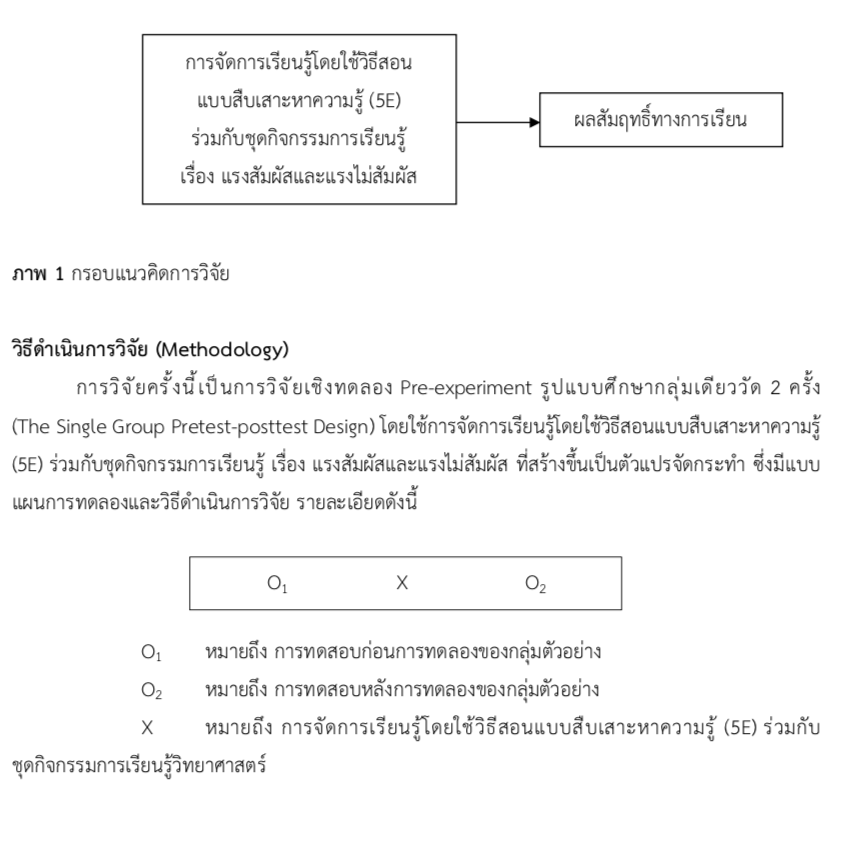A Study of Academic Achievement from Learning Management using Inquiry-based Teaching Methods (5E) Combined with an Activities Package in Contact and Non-Contact Forces of Pratomsuksa 3 Students
Main Article Content
Abstract
This experimental study aims to compare academic achievement in contact and non-contact forces before and after implementing inquiry-based teaching methods (5E) combined with an activities package for Pratomsuksa 3 students at Ramkhamhaeng University Demonstration School (elementary level). This research utilized a single-group pretest-posttest design and involved 30 students from one classroom selected through cluster random sampling. The research instruments consisted of (1) a lesson plan that applies the inquiry-based teaching method (5E) combined with an activities package in contact and non-contact forces, and (2) multiple-choice academic achievement exams. The data were analyzed using mean (M), standard deviation (SD), and a dependent samples t-test. The results indicated that students' mean academic achievement in contact and non-contact forces after learning management with the inquiry-based teaching method (5E) combined with an activities package was higher than before learning management, with statistical significance at the .05 level.
Downloads
Article Details

This work is licensed under a Creative Commons Attribution-NonCommercial-NoDerivatives 4.0 International License.
แนวคิดและข้อเสนอแนะที่นำเสนอในบทความของวารสารการบริหารและความเป็นผู้นำทางการศึกษา มหาวิทยาลัยรามคำแหง เป็นแนวคิดที่มาจากผู้เขียน หากมีความผิดพลาดใด ๆ ผู้เขียนเป็นผู้รับผิดชอบแต่เพียงผู้เดียว
ทั้งนี้ บรรณาธิการ กองบรรณาธิการ และคณะกรรมการหน่วยจัดทำวารสารฯ จะไม่ก้าวก่ายความมั่นคงในหลักการตามความคิดของผู้เขียน
ดังนั้น บรรณาธิการ กองบรรณาธิการ คณะกรรมการหน่วยจัดทำวารสาร และมหาวิทยาลัย จะไม่รับผิดชอบใด ๆ จากผลที่เกิดขึ้นจากการนำเสนอแนวคิด และข้อเสนอแนะของผู้แต่งที่เผยแพร่ในวารสารฯ
References
Brahmawong, C. (2008). Teaching Documents for Educational Technology, Units 1-5. Bangkok: United Productions. [In Thai].
Buakham, N. (2023). Inquiry-based Learning: Interest-curiosity-investigation a Learning Process that Allows Learners to Find Answers by Themselves. Retrieved December 20, 2024, from https://mappamedia.co/posts/inquiry-based-learning. [In Thai].
Fanchian, N. (2020). The 5 E’s of Inquiry-Based Learning. Retrieved December 21, 2024, from https://www.trueplookpanya.com/education/content/82385. [In Thai].
Institute for the Promotion of Teaching Science and Technology. (2023). Press Conference Announcing the Results of the PISA 2022 Assessment. December 20, 2024, from https://pisathailand.ipst.ac.th/news-21/. [In Thai].
Kanyaprasith, K. (2015). 5 Essential Features of Inquiry. Retrieved December 17, 2024 from http://sciedcenter.swu.ac.th/Portals/25/Documents/News/5 Essential features of inquiry_Kamonwan.pdf?timestamp=1434440007462. [In Thai].
Khanhavet, B. (2002). Educational Innovation. Bangkok: Chulalongkorn University Press. [In Thai].
Kongthan, S. and Kaewurai, W. (2020). The Development of a Science Learning and Activities Package according to Problem-based Learning to Promote Problem Solving Ability for Grade 3 Students. The 12th NPRU National Academic Conference, Nakhon-Pathom Rajabhat University, 196-202. [In Thai].
Ritjaroon, P. (2018). Research Techniques for Improving Learning. Chulalongkorn University Press. [In Thai].
Thanomphan, N. and Phusing, N. (2020). The Study of Learning Achievement on Force and Motion and Skill Scientific Process of Prathomsuksa 3 Students by using Inquiry Learning Model in Conjunction with Skills Exercises. Journal of MCU Ubon Review, 5(3), 193-203. [In Thai].


